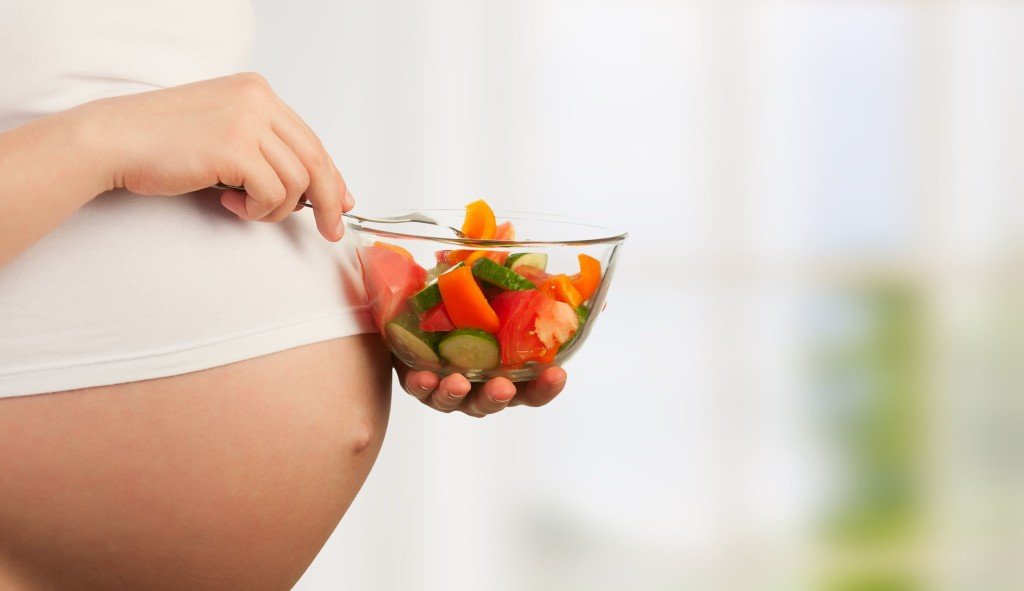Pregnancy is a period in which nutritional needs increase, on the one hand, due to the development of the fetus and on the other due to the new creation of structures such as the placenta, increase in mammary glands, etc.
How is the weight we gain during pregnancy distributed?
The approximate 10-12kg that we should gain during pregnancy is distributed as follows:
5kg approx: increase in fetal products
4.5kg approx: increases in the mother’s own body
Between 1 and 3kg increase in adipose tissue that ensures breastfeeding later.
A diet during this period is essential since it affects both the health of the mother and the fetus.

How does weight gain during 9 months?
It is progressive and accelerates as the pregnancy progresses.
In the first trimester, we barely gain weight, we can even lose 1-2kg due to vomiting or nausea that suppresses our appetite.
During the second trimester, the weight accelerates, the appetite is greater and we must control the increase since at this time we will gain about 6kg of which 2 go to the fetus but the other 4 go to the mother in the form of retention of water and fat.
In the third trimester, growth continues to accelerate but the distribution of the kilos is no longer the same since it is not the mother’s fat reserve that increases so much but rather everything that surrounds the baby.

Why are all foods important?
The proteins ensure the construction of the fetus and its annexes, you must increase your intake as the pregnancy progresses. Carbohydrates They are our preferred fuel, do not allow simple sugars to exceed 10% of the total intake of the day but you should never do without carbohydrates such as rice, pasta, potatoes… fats In pregnant women they have an essential role, on the one hand providing new energy (9kcal/gr) and on the other, they participate directly in the structure and functioning of cell membranes. During this period, fat intake should be around 20-25% of the total calories for the day.
Minerals, vitamins, and water cannot be missing from a pregnant woman’s diet. Below we will see the functions and benefits of some of them.
Calcium must take 400 mg/day and it is essential for bone reserves. Iron, 20-30% of pregnant women have a deficiency of this essential mineral to avoid developing anemia. Iodine, The approximate consumption should be 200mg/day, about 25g more than a non-pregnant woman.

As for vitamins, it may be enough to complement the diet with a vitamin supplement, although do not forget that vitamin D and folic acid are especially important. From the beginning of pregnancy until the fourth month of pregnancy, it is recommended to take a folic acid supplement to avoid malformations in the fetus.
Last but not least is the water addition to all the benefits that we already know, water is essential for binding to proteins, preventing constipation, contributing to the formation of amniotic fluid, or participating in the increase in circulating blood mass among other functions.
How to relieve some discomfort thanks to food?

Cramps: They can be caused by a lack of magnesium or calcium, which you can alleviate by eating nuts, green leafy vegetables, apples, and grapefruit. However, it can also be due to a lack of vitamin B6, which is present in poultry, fish, wheat, cookies, and milk.
Sciatica and back pain: They can occur because the baby pushes on the sciatic nerve, especially in the third trimester. In addition to applying dry heat to the area, you can eat foods rich in potassium such as potatoes, legumes, and bananas. Foods rich in vitamin C and potassium strengthen muscles and can prevent the discomfort of back pain.
Headache: Avoid spicy foods, chocolate, aged cheeses, alcohol and stimulants.
Constipation: Drink 2-3 liters of water during the day, increase the consumption of fiber present in vegetables, whole wheat bread, brown rice, or fruit, and go for a walk daily.
Nausea and vomiting: Before getting up you can try having a salty cracker and then something sweet to avoid acidity, avoid fried foods, fats, and too-strong flavors.
Once you have reviewed those nutrients that cannot be missing from your diet, do not forget to divide everything into 5 meals a day, and do not start the day without having breakfast or skipping any meals. A pregnant woman needs to increase her caloric intake but never eat twice as much and remember that the more you take care of yourself during pregnancy, the easier it will be to regain your figure after giving birth.
Share this content:




